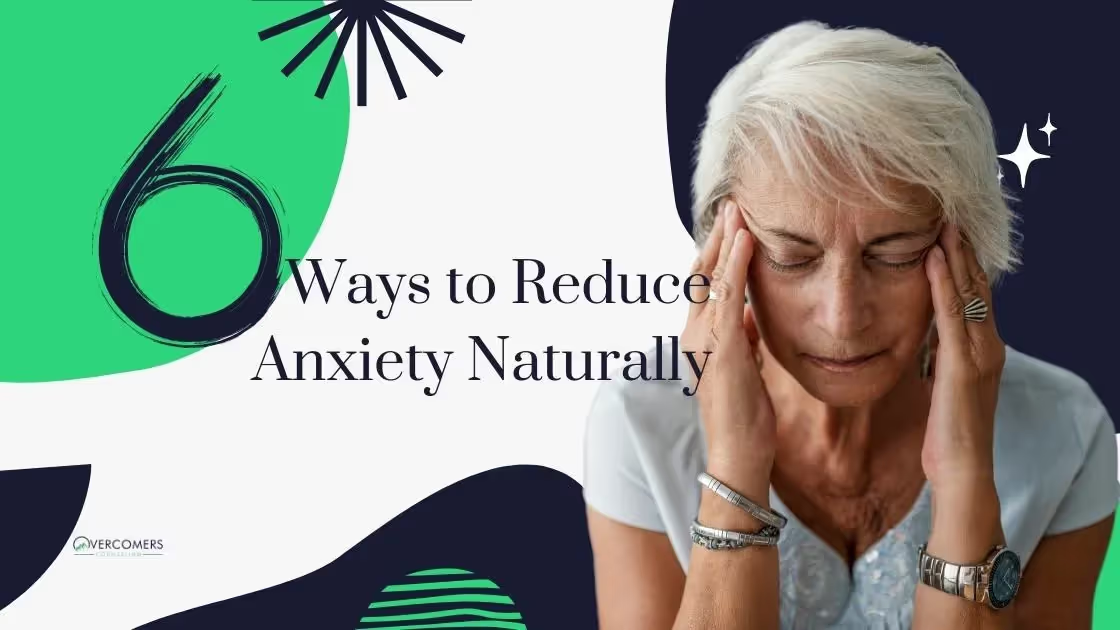Anxiety is a complex emotion that is felt by everyone at different points in time. While most anxiety is healthy, there are times when people experience...

Anxiety is a complex emotion that is felt by everyone at different points in time.
While most anxiety is healthy, there are times when people experience anxiety in a way that they themselves find to be extremely stress-inducing in their everyday life.
If anxiety is a hassle in your daily life, there are some ways to reduce anxiety naturally.
However, it should be noted that in certain instances Anxiety becomes a medical condition and should be dealt with, with the support of a trained professional.
Before we delve into the ways to reduce anxiety naturally, let's clarify what is anxiety.
There was a time when Anxiety was misunderstood and was seen strictly as a demon in our lives.
The increased heart rate, shortness of breath, palpitations, and shorter breaths are uncomfortable, to say the least.
However, a deeper exploration and research into the matter explains anxiety as our body's response to threats and danger.
It is our body communicating to us, "Hey, there is danger ahead... let's do something about it!"
There are some ways to identify anxiety.
These could vary from person to person, situation to situation, and from time to time.
Thus, before we examine the ways to reduce anxiety naturally, let's look at the symptoms:
Please note, that while experiencing these symptoms is normal, a persistent or extreme experience may be indicative of a disorder that requires medical attention.
One way to reduce anxiety naturally is mindfulness meditation.
Anxiety often coaxes us into a bubble of sorts that seems all-consuming, and it may feel like you're getting sucked into the bubble.
Reducing anxiety naturally, in such a case, may entail popping the bubble, and becoming more present, being in the moment.
A few things to keep in mind while trying to do mindful meditation:
Experience your thoughts and yourself without any judgment. Be accepting of yourself.
Instead of deciding how you feel or should feel about your experience, simply experience it.

Often, Anxiety is accompanied by shorter breaths.
However, taking longer breaths lets your system calm down instead of hyperventilating.
Deep breathing helps to reduce anxiety naturally by restoring the normal breathing pattern, before the feelings of unsafety.
The exercise is done by taking deliberate slow, even, and deep breaths.
Mindfulness meditation accompanied by intentional breathing are also a means to reduce anxiety naturally.
Remember, Breathe in, Breathe out.
Identifying Anxiety better equips us to tame it. One of the ways to reduce anxiety naturally is to question the thoughts behind the bodily responses.
Usually, if someone comes up to us and goes, "Hey, the road ahead is steep, be careful!", we call them a jolly-good person and take their advice.
Seeing anxiety as such an acquaintance can help one decipher if we are in a safe place and if not, how can we access that safety?
Sometimes, a writing journal helps to monitor our anxious thoughts and how they made us feel.
You can include your responses, how you felt about the response, what would make you feel safe, and how can you change this?
However, be mindful of the fact that while some situations require a shift in our focus, some situations can simply not be changed and may require a different approach.
One of the most natural ways is to be cared for by another being.
Thus, examining these thoughts and anxiety with a trained professional is also something that one can do.
When you are feeling extremely anxious, exercise may seem like a huge task.
Thus, it is imperative to view physical activity as a preventive way to reduce anxiety naturally.
Exercising results in changes in our body that protect us from developing chronic anxiety.
At a more surface level, it can simply serve as a distraction.
While, on the other hand, it helps to bring our heart rate up, and at the same time changes the chemistry of our brain to invite neurochemicals such as Serotonin, Gamma-aminobutyric Acid (GABA) that alleviate anxiety.
This does not mean that it is mandatory for you to hit the gym.
The kind of exercise you'd want to engage in depends entirely on you. You can also start with low-impact workouts and move towards something that gets your heart rate up.

Aromatherapy is a healing treatment that is not new to us.
Using natural plant extracts, aromatherapy is used for improving emotional and physical health
. One can simply add it to warm water or even use it in a diffuser. The option is yours.
When one is battling the effects of anxiety on sleep, an effective way to reduce anxiety naturally has been found in a 2011 study.
Aroma oils like Lavendar bring the heart rate down and facilitate a smooth sleep for people who are experiencing anxiety.
The effects are also seen in the long term.
Many people choose to have herbal tea for relieving their anxiety.
Chamomile tea, in particular, has been associated with calmer nerves in multiple studies.
Although there is a need for more evidence for the same, since it is a natural remedy, you can try it as per your liking and availability.
Although anxiety seems like a tough fight, remember that you have an arsenal of tools with you.
These tools may be physical: deep breathing, exercising, or even cognitive: reframing and therapy.
The duration of anxiety counseling varies for each individual, depending on the severity of their anxiety and their progress in therapy. Our therapists will regularly assess your progress and adjust your treatment plan as needed.
It's important that you feel comfortable discussing personal matters with your therapist in order to open up and get more out of therapy sessions; therefore finding someone who meets certain criteria like experience level, expertise areas, and personality is key when selecting a therapist who can give meaningful feedback about how best handle issues related to anxiety or other mental health concerns.
Ignoring anxiety can exacerbate symptoms and make it more challenging to manage over time. This can result in a negative impact on your personal, professional, and social life, leading to feelings of isolation and even depression.
Other activities which have been found helpful in reducing both immediate feelings of anxiousness and long-term anxieties associated with chronic disorders include yoga, journaling, nature walks, art therapy, volunteering, and other low-stress activities. Additionally, developing a healthy lifestyle incorporating adequate sleep, physical activity, and nutritious meals can help reduce overall stress levels.
Yes, Medicaid provides insurance coverage for therapy services specifically designed to help individuals struggling with anxiety, depression, and other mental health conditions.
To reduce your anxiety, you can practice relaxation techniques such as deep breathing, progressive muscle relaxation, guided imagery, and mindfulness practices. Additionally, regular exercise has been found to be beneficial in managing stress and improving mental health.